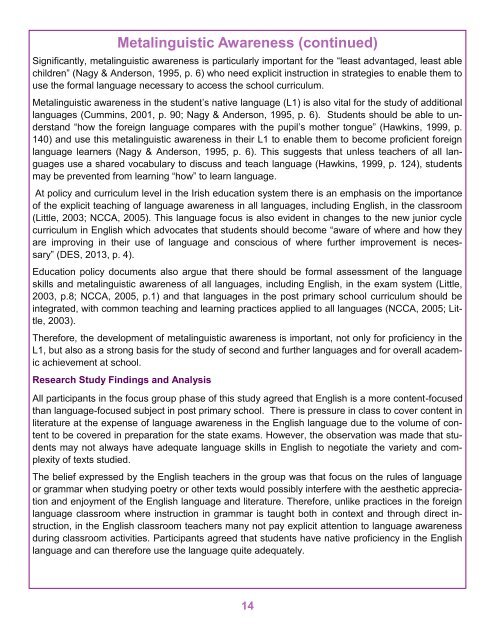LITERACY NEWS
LAI Newsletter 20_05_2015
LAI Newsletter 20_05_2015
- No tags were found...
Create successful ePaper yourself
Turn your PDF publications into a flip-book with our unique Google optimized e-Paper software.
Metalinguistic Awareness (continued)Significantly, metalinguistic awareness is particularly important for the “least advantaged, least ablechildren” (Nagy & Anderson, 1995, p. 6) who need explicit instruction in strategies to enable them touse the formal language necessary to access the school curriculum.Metalinguistic awareness in the student’s native language (L1) is also vital for the study of additionallanguages (Cummins, 2001, p. 90; Nagy & Anderson, 1995, p. 6). Students should be able to understand“how the foreign language compares with the pupil’s mother tongue” (Hawkins, 1999, p.140) and use this metalinguistic awareness in their L1 to enable them to become proficient foreignlanguage learners (Nagy & Anderson, 1995, p. 6). This suggests that unless teachers of all languagesuse a shared vocabulary to discuss and teach language (Hawkins, 1999, p. 124), studentsmay be prevented from learning “how” to learn language.At policy and curriculum level in the Irish education system there is an emphasis on the importanceof the explicit teaching of language awareness in all languages, including English, in the classroom(Little, 2003; NCCA, 2005). This language focus is also evident in changes to the new junior cyclecurriculum in English which advocates that students should become “aware of where and how theyare improving in their use of language and conscious of where further improvement is necessary”(DES, 2013, p. 4).Education policy documents also argue that there should be formal assessment of the languageskills and metalinguistic awareness of all languages, including English, in the exam system (Little,2003, p.8; NCCA, 2005, p.1) and that languages in the post primary school curriculum should beintegrated, with common teaching and learning practices applied to all languages (NCCA, 2005; Little,2003).Therefore, the development of metalinguistic awareness is important, not only for proficiency in theL1, but also as a strong basis for the study of second and further languages and for overall academicachievement at school.Research Study Findings and AnalysisAll participants in the focus group phase of this study agreed that English is a more content-focusedthan language-focused subject in post primary school. There is pressure in class to cover content inliterature at the expense of language awareness in the English language due to the volume of contentto be covered in preparation for the state exams. However, the observation was made that studentsmay not always have adequate language skills in English to negotiate the variety and complexityof texts studied.The belief expressed by the English teachers in the group was that focus on the rules of languageor grammar when studying poetry or other texts would possibly interfere with the aesthetic appreciationand enjoyment of the English language and literature. Therefore, unlike practices in the foreignlanguage classroom where instruction in grammar is taught both in context and through direct instruction,in the English classroom teachers many not pay explicit attention to language awarenessduring classroom activities. Participants agreed that students have native proficiency in the Englishlanguage and can therefore use the language quite adequately.14


